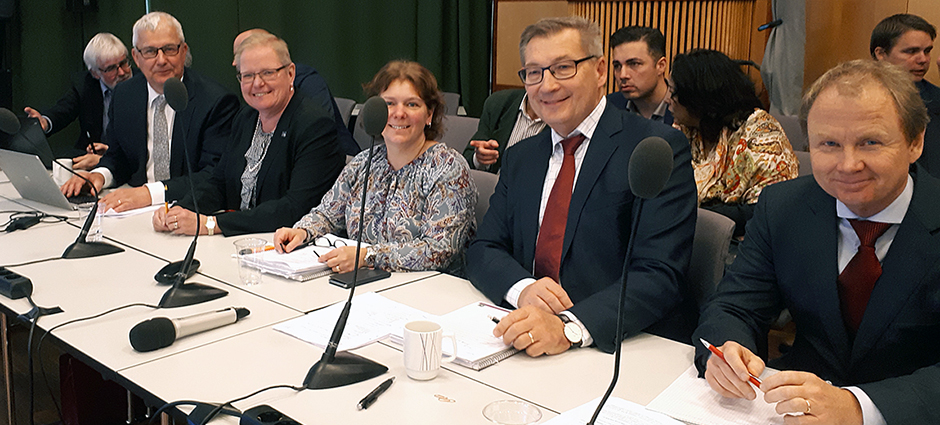Environmental licensing is now concluded
The five week long environmental licensing in the Land and Environment Court regarding SKB’s application for a licence to build a system for managing and disposing of Sweden’s spent nuclear fuel was concluded on October 26th.
During the previous weeks of the hearing, the court has asked SKB, the Swedish Radiation Safety Authority (SSM) and other parties a number of questions. Both Monday and Tuesday were devoted to providing answers to these questions. The topics included SKB’s view on the parallel licensing processes under the Environmental Code and the Nuclear Activities Act, copper corrosion and whether long-term safety is relevant for the licensing with respect to the impact on the national interest of nature conservation, Natura 2000 areas and the protection of species.
Parallel licensing processes
The other parties had an opportunity to comment on SKB’s presentations. SSM’s assessment with respect to the parallel licensing processes under the Environmental Code and the Nuclear Activities Act is that the licensing under the Environmental Code concerns general issues, while the licensing under the Nuclear Activities Act is more focused on safety issues. SSM also mentioned the stepwise procedure with an increasing level of detail for each step.
On Tuesday, it was SSM’s turn to answer the questions asked by the court during the previous weeks of the hearing. SSM presented a compilation for the Spent Fuel Repository, for which SKB needs to submit additional information during a continued stepwise licensing under the Nuclear Activities Act.
Protective measures and conditions
SKB presented updated proposals for protective measures, conditions, authorisations and obligations, which by now have grown into an extensive catalogue. SKB’s legal representative emphasised that these are not conditions for permissibility, they are conditions for a licence.
The other parties were given the opportunity to comment on SKB’s updated proposals for conditions. The municipalities and authorities are positive to SKB’s proposed conditions and obligations. Only minor suggestions for adjustments and clarifications were offered.
Legally protected species
SKB also presented a comprehensive assessment of the impact on protected species and Natura 2000 areas, as well as the need for exemption. SKB’s conclusion is that the activities in the application will not affect the environment in Natura 2000 areas in any significant way. SKB believes that the national interest of nature conservation and the national interest of final disposal of spent nuclear fuel and nuclear waste can coexist and that the activities in the application will not result in any significant damage to natural values. Furthermore, SKB’s assessment is that the activities in the application will not adversely affect the preservation status for any species covered by the Species Protection Ordinance and therefore there are reasons for an exemption.
Closing arguments
The last day of the hearing began with SKB and SSM answering remaining questions from the court. Thereafter, it was time for the closing arguments. SKB started, followed by the other parties.
In summary, it can be said that Oskarshamn Municipality, SSM and other authorities repeated that they approve of granting permissibility according to the Environmental Code. Östhammar Municipality will give a final answer after the referendum. Both municipalities emphasised that the conditions are already of great importance for them, since they will issue statements on the issue of permissibility to the Government. Both municipalities are of the opinion that SKB has responded to and complied with most of the viewpoints presented by the municipalities.
The court concluded the five week long hearing by announcing that its statement to the Government will be given on January 23 2018. When the Government has taken a decision on permissibility, the case is returned to the Land and Environment Court for further processing.
Previous articles about the environmental licensing
